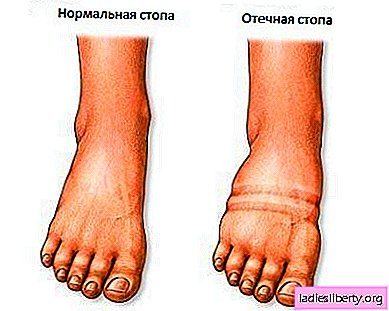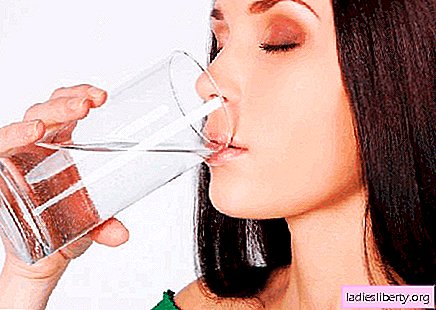
With peripheral edema, the subcutaneous tissue (most often the extremities) becomes the accumulation of fluid. Under pressure, the skin stretches, loses elasticity, and can become hot. Edema is accompanied by a feeling of heaviness, compression, worsening joint mobility, pain.
Causes of edema
• Fluid retention.
The accumulation of water in the tissues, causing swelling of the face, hands, ankles, feet, provokes excessive sodium intake. The outflow of fluid worsens with prolonged exposure to a static position.
• inflammation.
The inflammatory process, fraught with edema, develops with allergies, injuries (fracture, dislocation), arthritis, phlegmon, gout, tissue infection.
• Medicines.
Nonsteroidal anti-inflammatory drugs (naproxen, ibuprofen, diclofenac, aspirin, ketoprofen, piroxicam, indomethacin), insulin analogues, antihypertensives and drugs used in steroid therapy disrupt the balance of sodium and potassium, causing swelling and impaired renal function.
• Protein in the blood is below normal.
Albumin is synthesized by the liver. If the organ malfunctions, problems with the functioning of the kidneys, malnutrition, enteropathy, the protein concentration decreases, swelling appears.
• Vascular obstruction.
With venous insufficiency, the supply of blood to the lower extremities worsens, the feet and ankles swell. Thrombosis and varicose veins can develop (in this case, the legs, feet “buzz”, traces of clothing stitches, gum socks remain on the skin for a long time).
• Kidney disease.
When the kidneys lose their ability to excrete sodium, and with it water, pressure on the vessels increases, and edema develops. Swollen eyelids and undercoats are the first to signal the problem.
• Heart failure.
With damage to the myocardium, the heart is not able to maintain blood circulation at the required level. Blood stagnates, organs suffer from hypoxia, acidosis, and renal failure develop. Ankles swell (usually by the end of the day), shortness of breath, weakness, feeling of lack of air, tightness in the chest may appear.
• Hormonal disorders.
The body can respond to edema to the development of hypothyroidism. Edematous areas (feet, legs) in this case are dense, pressure on the skin leaves no residue.
• Congestion in the lungs.
The work of the heart and lungs is interconnected. Pulmonary hypertension may be the answer to a malfunction in the circulatory system.
Excess fluid accumulates with emphysema, fibrosis, collecting in air sacs, causes pulmonary edema.
Treatment of peripheral edema with natural methods
1) Refusal of salt.
The amount of sodium in the body is controlled by the kidneys, removing the excess element through the urine. In case of organ malfunction, blood flow deterioration, sodium concentration rises, water accumulates.
The elimination of puffiness will be eliminated by the exclusion of sodium-containing foods: junk food, processed meats, ham, soy sauce, instant noodles, table salt, chips, olives, salted nuts, pickles, canned goods, breakfast cereals, pastries, hard cheese.
To maintain an acceptable concentration of the element, it is sufficient to obtain sodium from natural sources: seaweed, anchovies, sardines, eggs, squid, mussels, legumes, tomatoes, beets, celery, offal, whole grain cereals.
They get rid of excess fluid: apples, green tea, cottage cheese, lemon, ginger, zucchini, cranberry juice, eggplant, cucumbers, watermelon, carrots, garlic, asparagus, horseradish.
2) Movement.
To maintain blood circulation, it is important to stay active throughout the day. When sedentary work (or associated with the need to stand up for a long time), you need to warm up every hour and a half. If possible, walk for 5-10 minutes or strain / relax the muscles of the limbs, rotate in the feet, crouch, do inclines.
In the evening or in the morning to devote more time to sports load, doing running, walking, swimming, performing stretching. One of the obligatory exercises is a "bicycle" (rotation of the legs stimulates blood flow).
During the day, it is useful to raise the limbs (putting a roller, pillow) for at least 20 minutes - this will improve the outflow of fluid.
3) Water.
The presence of edema does not mean that water consumption should be abandoned. Dehydration can also cause swelling (ankles, wrists, lower abdomen).
The main rule: observe moderation - do not abuse diuretic teas, juices. There is enough water up to 2 liters per day, and this quantity must be distributed evenly for 10-12 receptions.
4) Massage.
Gentle exposure reduces blood pressure, stimulates blood circulation. Often recommended for leg edema. It is deep, pointy and segmental. The procedure is preferably entrusted to a specialist (reflexologist, massage therapist) - this is necessary to avoid traumatic effects on edematous tissues.
5) Dandelion.
Natural diuretic. Not only activates the kidneys, but also increases and has a beneficial effect on liver function, helping to eliminate toxins that provoke inflammation.
Pour a tablespoon of dried dandelion leaves with a glass of boiling water, leave for at least 10 minutes. Take a decoction 3 times a day, two tablespoons. You can also use dandelion root, insisting it for 20-30 minutes.
You can not use the plant for allergies, gastritis, ulcers, hypoglycemia, taking blood-thinning drugs.
6) Parsley.
Another natural diuretic. In addition to eating fresh food (in salads, soups, stews, smoothies), stems and leaves can be used as raw materials for making tea: for a cup of boiling water - a pinch of finely chopped leaves (you can with the stem), brew for 5 minutes. The drink should not be consumed during pregnancy, jade, during menstruation, in case of blood coagulation.
7) Essential oils.
Liquid is removed, grapefruit and fennel oil stimulate blood circulation.
Grapefruit oil activates the lymphatic system, promotes detoxification, eliminates bloating, relieves joint pain, cramps.
To treat the swollen area, use in combination with coconut or olive (3 tablespoons of grapefruit oil per tablespoon of base). Fennel oil is used in the same way.
Peripheral edema may indicate the development of a serious disease - heart, kidney failure, impaired lung function. If swelling is accompanied by shortness of breath, chest pain, dizziness, urgent medical care is needed.
Water balance, moderate salt intake, physical activity, weight normalization will prevent fluid retention.











